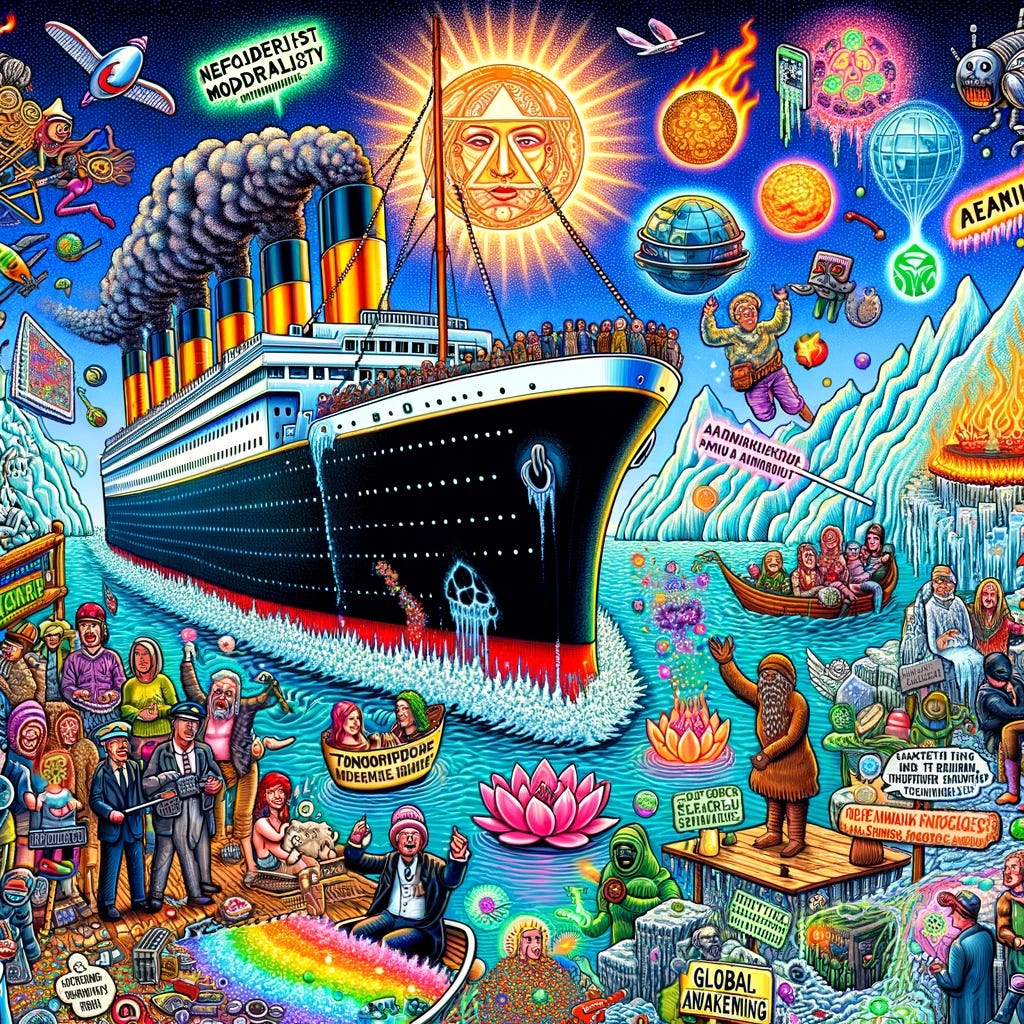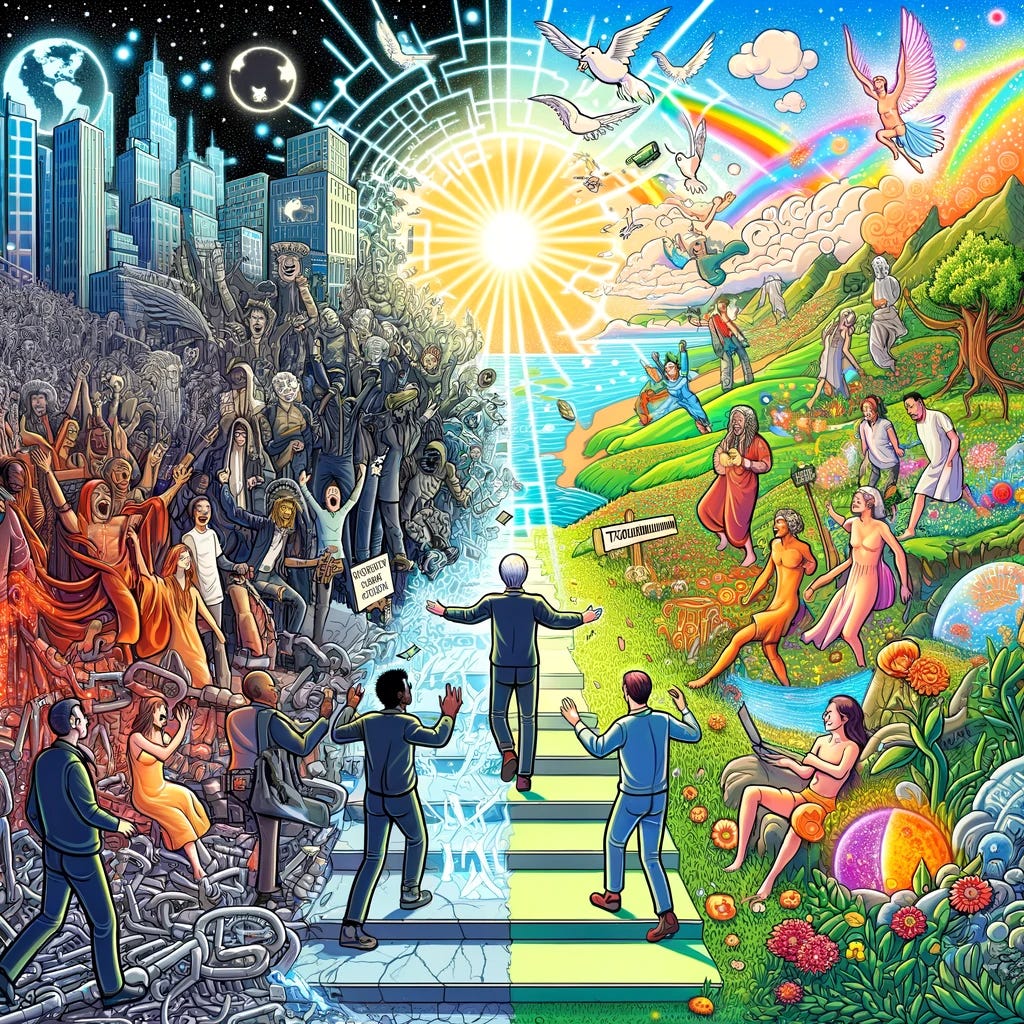Rethinking "Multitude"
As AI accelerates, could displaced knowledge workers identify themselves as a new revolutionary subject?
I’ve slipped into one of my periodic bouts of twilight reflection on the current paradigm of our civilization. Call it Neoliberalism, Capitalist modernity, or Technofeudalism. During such times, I keep thinking—find it constantly shocking – here we are, all trapped together in this obsolete clusterfuck of a “death culture” system and paradigm, this lurching Titanic spewing icy water from all pores.
As our planet’s ecosystems buckle and collapse, “we” keep enriching and also showering attention on the tiny cadre of elite wealth holders (some on the Asperger/narcissist/psychopath spectrum) who have gamed the political and financial system for their own short-term benefit. “They” control the mass media, dole out the pharmaceuticals, own the banks. The internet seemed a tool of human liberation, once upon a time. In just a few years, “they” effectively turned it into a gigantic surveillance Panopticon and shopping mall, but “we” all aquiesced.
We allowed Libertarian tech magnates to cannibalize what should have been the digital commons, built with taxpayer money. The government gave the Internet to the corporations and the plutocrats to convert big chunks of it into their private feifdoms, with the people getting nothing in return. In a prime example of the victim/perpetrator bond, we still applaud these technocrats as they pursue immortality through biotech, or seek to upload their omnivorous egos to the virtual cloud, or drop a cool $100 million on a Mediterranean yacht or Hawaiian apocalypse bunker. If all else fails, they intend to escape Earth, colonizing other planets while entire continents starve to death and perfected systems of virtual control snuff out human liberation with ever-greater efficiency.
Having said this, I still hold out “hope”… many varieties and gradations of hope. I am almost terrifyingly optimistic, internally glowing with mystical, utopian idealism in rainbow hues.
This human experience is, simply, too mysterious, too wildly improbable, to allow for anything but deep faith in the magical and miraculous. As analytic idealism and Eastern mysticism reminds us, we are dream-characters in a dream-universe, carefully designed and scripted for us to play our parts, exactly as we do.
I still yearn to contribute to a spontaneously emergent, rapidly self-organizing global movement rising up to confront and overcome the current unjust system of Capitalist modernity or Neoliberalism or Technofeudalism, replacing it with something better, more equitable, more humane, more fun, mystical, animist, regenerative, ticklish. I realize this seems impossible from a purely rational perspective. But, as French radicals put it in 1968, “Be realistic: Demand the impossible.”
Sometimes when we surrender, detach, give up, things start to move and morph. What seemed impossible suddenly returns as the most obvious, sensible thing.
I witnessed how this can happen with psychedelics. When I published Breaking Open the Head (2002) on the value of shamanic experience, I felt like a voice crying in the wilderness. The entire structure of mainstream society, its academic and media institutions, refused to see psychedelics as anything but useless distractions for deadbeat hippies. Twenty years later (for better and worse), psychedelics are resoundingly celebrated.
As we speak, the Neoliberal mega-machine is working overtime to neutralize any possible ideological threat from the entheogenic experience so it can seamlessly assimilate these compounds as new profit centers and a new market. The same mainstream, entrepreneurial types who snidely dismissed psychedelics back then are now launching companies and retreat centers in the “psychedelic space.” The focus is personal healing, divorced from systemic analysis or paranormal activity.
As Kurt Vonnegut put it in Slaughterhouse Five, “So it goes.”
I suppose it must be for the good that so many people are now exploring psychedelics – that the stigma has been removed. I admit I am suspicious that it is so good in some ways. Psychedelics are being incorporated into the same mental health paradigm that separates the individual’s well-being from that of society’s as a whole. You can inject Ketamine to deal with depression and anxiety, dissociating from your own part in the planetary emergency.
What’s happened since marijuana was legalized seems a warning. New York City now has weed dispensers on every corner. You smell pot everywhere and many people seem constantly stoned out of their gourds. Kids are going to the ER after ingesting new products with super-concentrated amounts of THC. It feels very low vibration. Of course I don’t want people going to prison for pot. But the current proliferation seems mindless and strangely depressing – almost a new kind of social control mechanism.
Like an overactive immune system, Neoliberalism or Capitalist modernity efficiently neutralizes anything that might pose a threat to it, and then figures out, over time, how to feed off of it, growing stronger in the process. As my friend Alnoor Ladha put it in last week’s session of our seminar, Building Our Regenerative Future (which you can still join here), Capitalist modernity is a “complex adaptive system.” It functions, in many respects, like a living, evolving organism. But it is closer to a zombie, vampire, or parasite, seeking to consume anything that possesses unique spirit or organic vitality, anything that might oppose it, to perpetuate itself.
Our debt-fueled global economy has to keep growing or it implodes. It seems to be the case that the global financial system – the financialized economy, based on speculative assets – died on the operating table in the 2008 crash. Everything is intentionally made to seem very complex and inscrutable, so most people never make the proper connections. For example, instead of focusing on the increasing ratio of CEO to worker pay from twenty to over 300 times in the last decades, or the enormous transfer of wealth from the working and middle class to a tiny group of tech and finance overlords, the people’s anger gets misdirected toward grotesque conspiracy theories and other frauds.
Somehow, this overwhelming but deeply unsustainable system must be approaching its expiration date. It could be tomorrow, next year, a decade— certainly less than a half-century away. Although the mainstream politicians and pundits won’t admit it, it seems obvious we are already in the downscaling or decomposition process—that this happens slowly rather than suddenly, through an ongoing loss of possibility, a closing down of options. Think of all the places in the world it is no longer safe to visit, or all of the natural preserves that are now despoiled, or of all the places it is no longer worth visiting because they just offer the same air-conditioned hotels and chain stores, the same monoculture with barely different decor.
I’ve always been able, Existential Kink style, to take a strange kind of self-alienated pleasure in my own unease and discomfort—I appreciate Carolyn Elliot for calling out this very human tendency. I suppose many people do this. We look around at the quotidian ruins of this civilization, and find enough solace in it, somehow, to continue, however cynically. But I still feel “we” need to go beyond this, into collective action and post-cynicism.
Between the individual body and the larger body of society—the collective soul—we encounter this enormous, unbridgeable gulf, at least in our contemporary Western society, the developed world. We got indoctrinated, since birth, into the cult of hyper-individualism, which is the basis of bourgeois society. My personal interests are somehow opposed to the collective interests. I must consider my wealth, my genetic legacy, as more important to me than that of the other people, and fight for my share.
Currently, I am considering the possibility that “Reclaim the digital commons” or “Deprivatize the Internet” could be a rallying cry for a new social movement. Books supporting this idea (in case anyone wants to follow along) include Ben Tarnoff’s Internet for the People, Yannis Varoufakanis’ Technofeudalism, and Roger McNamee’s Zucked. Also Naomi Klein’s Doppelganger.
Keep reading with a 7-day free trial
Subscribe to Liminal News With Daniel Pinchbeck to keep reading this post and get 7 days of free access to the full post archives.




